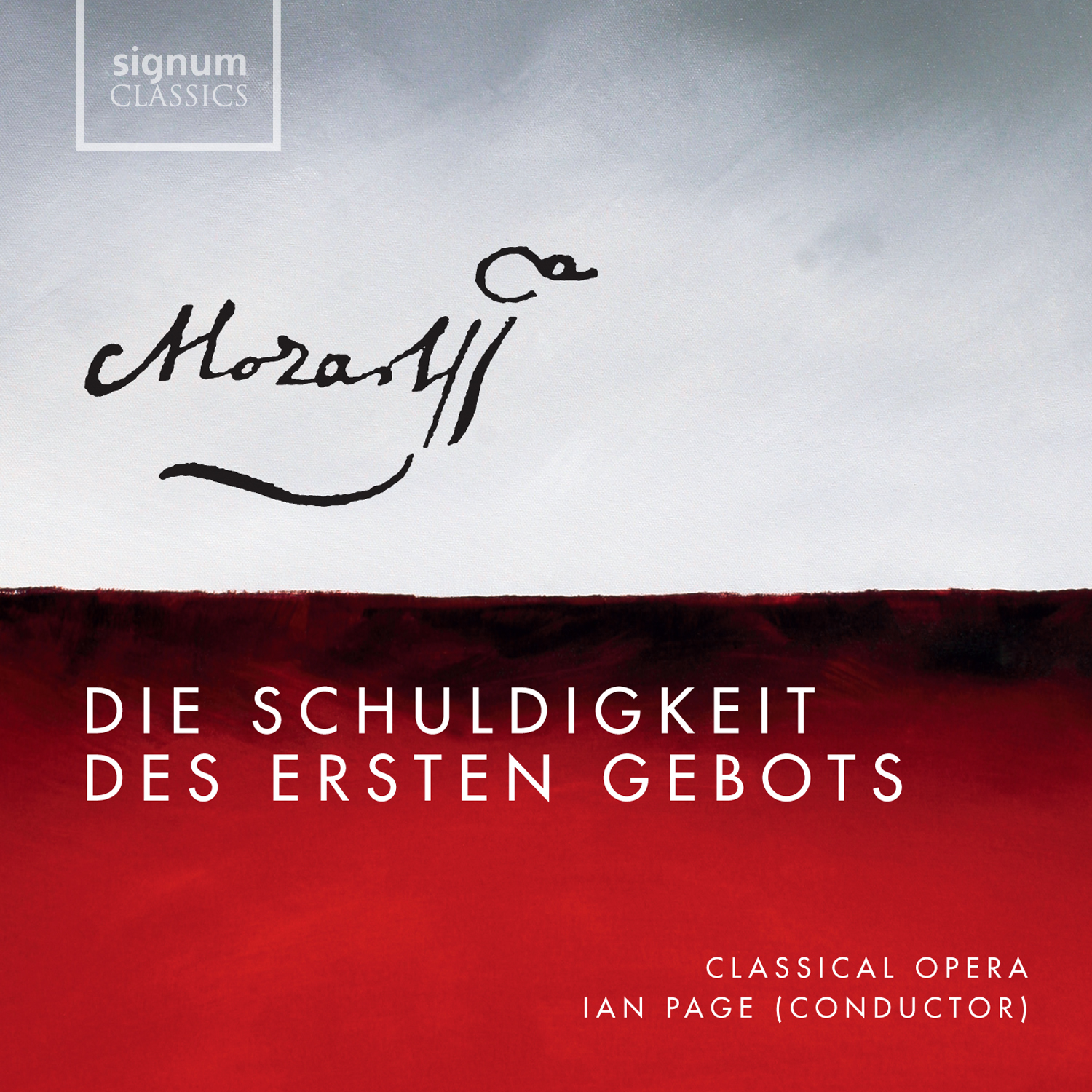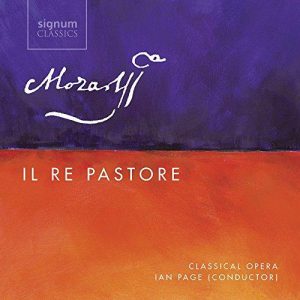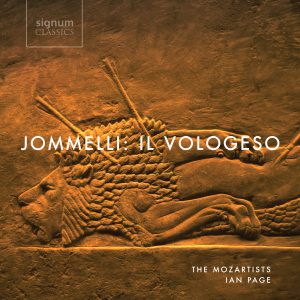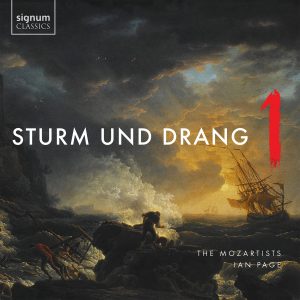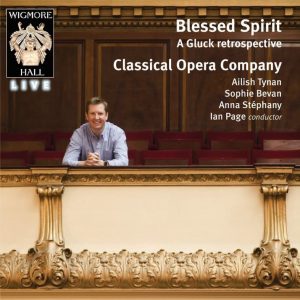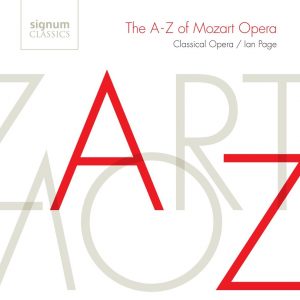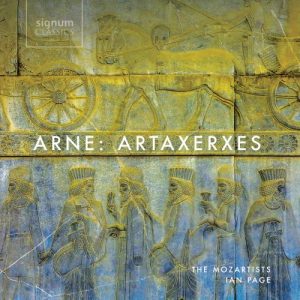Following the acclaimed recording of Apollo et Hyacinthus in May 2012, Classical Opera’s complete Mozart Opera Recording Cycle continues with Die Schuldigkeit des ersten Gebots, Mozart’s very first dramatic work, composed when he was just 11.
Below is a film about the opera and the recording process.
The making of Die Schuldigkeit des ersten Gebots from TallWall Media on Vimeo.
CD 1
- Sinfonia3:20
- Recitative: “Die löblich’ und gerechte Bitte” (Gerechtigkeit, Christgeist, Barmherzigkeit)1:46
- No. 1, Aria: “Mit Jammer muß ich schauen” (Christgeist)6:05
- Recitative: “So vieler Seelen Fall” (Barmherzigkeit, Gerechtigkeit)1:59
- No. 2, Aria: “Ein ergrimmter Löwe brüllet” (Barmherzigkeit)6:14
- Recitative: “Was glaubst du” (Barmherzigkeit, Gerechtigkeit, Christgeist)0:51
- Accompanied Recitative: “Wenn aus so vieler Tausend Mund” (Christgeist, Barmherzigkeit, Gerechtigkeit)2:20
- No. 3, Aria: “Erwache, fauler Knecht” (Gerechtigkeit)7:36
- Recitative: “Er reget sich” (Christgeist, Barmherzigkeit, Gerechtigkeit)0:18
- Accompanied recitative: “Wie, wer erwecket mich?” (Der Christ, Weltgeist, Christgeist)3:56
- No. 4, Aria: “Hat der Schöpfer dieses Leben” (Weltgeist)7:14
- Accompanied recitative: “Daß Träume Träume sind” (Der Christ)1:28
- No. 5, Aria: “Jener Donnerworte Kraft” (Der Christ)9:37
CD 2
- Recitative: “Ist dieses, o so zweifle nimmermehr” (Weltgeist, Der Christ, Christgeist)1:43
- No. 6, Aria: “Schildre einen Philosophen” (Weltgeist)5:14
- Recitative: “Wen hör’ ich nun hier” (Weltgeist, Der Christ, Christgeist)4:06
- No. 7, Aria: “Manches Übel will zuweilen” (Christgeist)7:29
- Recitative: “Er hält mich einem Kranken gleich” (Der Christ, Christgeist, Weltgeist)2:26
- Recitative: “Hast du nunmehr erfahren” (Barmherzigkeit, Christgeist, Gerechtigkeit)1:11
- No. 8, Trio: “Laßt mir eurer Gnade Schein” (Christgeist, Barmherzigkeit, Gerechtigkeit)9:36
The setting is a pleasant area with a garden and a small wood. In a shrubbery lies a half-hearted Christian (Der Christ). He is fast asleep, and three allegorical figures – The Spirit of Christianity (Der Christgeist), Divine Justice (Gerechtigkeit) and Divine Mercy (Barmherzigkeit) – are discussing his predicament.
Christianity pleads on behalf of the sleeping man, begging Justice and Mercy to save mankind from spiritual inertia. They are sympathetic to his plea, but point out that neither of them can be of help if mankind continues along this indolent path.
Christianity argues that a vivid warning of infernal damnation might shock the half-hearted Christian into recognising the error of his ways. Justice agrees, and wakes up the sleeping man by presenting to him in a dream a nightmarish vision of his Day of Judgement.
Justice and Mercy now retire to the heavens, and Christianity observes from a hiding place as the Christian awakens and contemplates the terrifying voice that he has heard in his sleep. The Spirit of Worldliness (Der Weltgeist) now arrives, though, and urges the Christian to forget about his dream and to follow her pleasure-seeking philosophies. The Christian is partially comforted, but still feels troubled by his dream.
Worldliness concludes that the Christian’s dream must have been a trick played by her arch-enemy, whom she denounces as a sanctimonious killjoy. Unable to contain himself any longer, Christianity now appears disguised as a doctor and engages in conversation with the Christian, who is eager for advice and treatment. Worldliness becomes bored by their conversation and withdraws to prepare breakfast, enabling the doctor to set about his task of offering the Christian a cure.
The Christian is amazed to learn that the doctor already knows of his dream, and accepts the medicine that he is offered. Just as the doctor seems to be making significant progress, however, Worldliness returns to invite the Christian to a breakfast party. The Christian makes his excuses to the doctor, but promises to try the medicine.
Mercy and Justice now return. They insist that they cannot help this man if he is unable to help himself, but Christianity asks for more time. He is now hopeful and confident that he can convert this lost soul, thereby increasing the fame and lustre of both Mercy and Justice.
Although the music has been lost for Michael Haydn and Anton Adlgasser’s second and third parts of Die Schuldigkeit des ersten Gebots, the libretto has survived.
In Part Two, Worldliness tries unsuccessfully to persuade the half-hearted Christian to kill a thief who has stolen both his money and his beloved. Christianity, meanwhile, has returned disguised as a gardener, and the gardening imagery is sustained as Justice and Mercy compare the Christian to a tree which, though in full leaf, is barren. Justice advocates cutting the tree down, but Mercy persuades her that they should prune the old branches to enable the tree to bear new fruit.
In Part Three, the Christian emerges full of contrition, humility and zeal. He is easily able to repel the final temptations of Worldliness, who is eventually driven away by Christianity, and the remaining characters unite in praise of their Creator.
Die Schuldigkeit des ersten Gebots – an introduction by Ian Page
The first part of the sacred singspiel Die Schuldigkeit des ersten Gebots, which was first performed in the Knights’ Hall of the Archbishop of Salzburg’s Palace on 12 March 1767, represents Mozart’s first extended dramatic work. He was eleven years old when he wrote it.
The performance of secular plays or operas during Lent had long been prohibited, and over the previous century and a half a tradition had developed of performing didactic religious dramas during the period. These generally featured allegorical and pedagogic stories from the Bible, from the lives of saints or from church history.
Music played an increasingly prominent part in these dramas, which by the second half of the eighteenth century had assumed a virtually operatic form. It was not uncommon for the task of setting such works to music to be divided between a number of composers, and Die Schuldigkeit des ersten Gebots followed this practice: Mozart composed the first part, with the more senior Salzburg composers Michael Haydn and Anton Adlgasser setting Parts Two and Three. Of the three, only Mozart’s score has survived.
Mozart’s childhood
Wolfgang Amadeus Mozart (or, to give him his full name, Johannes Chrysosto[mos] Wolfgangus Theophilus Mozart) was born on 27 January 1756. He was the seventh child of Leopold and Anna Maria Mozart, although of the preceding six only the fourth, ‘Nannerl’, had survived infancy. His father, a musician at the court of the Archbishop of Salzburg, had recently completed his famous treatise on the fundamentals of playing the violin, which rapidly established itself as the most popular and authoritative book on the subject, and it was from Leopold that Wolfgang received his early tuition.
Mozart’s earliest surviving compositions – short sketches and doodlings rather than fully worked out pieces – were written at the age of five, and the following year he and his sister (who was herself a highly talented keyboard player) performed in Munich at the court of the Bavarian Elector and in Vienna for the Empress Maria Theresia and Emperor Francis I. These performances were so successful that in June 1763 the Mozart family embarked on a Grand Tour of northern Europe which was to last for three-and-a-half years. Wolfgang and Nannerl gave concerts in Munich, Augsburg, Frankfurt and Brussels before they reached Paris on 18 November 1763. After a stay of almost five months, during which time Mozart heard copious amounts of new music and published his first sonatas, they set off for London, where they remained for fifteen months. This was to prove an even more valuable and formative experience, and Mozart was to write his first symphonies and concert arias in the English capital. He was also able to attend numerous concerts and operas, and to befriend Johann Christian Bach (the youngest son of the great Johann Sebastian), whose music was to have a significant and lasting influence on Mozart’s compositional style.
The return leg of their journey took them to Holland, where both children contracted typhoid fever and came close to death, and then through France, Switzerland and Germany, before they arrived back in Salzburg on 29 November 1766.
The ten-year-old who returned home after such a lengthy absence already had an impressive portfolio of compositions to his name. During his various travels he had been exposed to a vast array of music by some of the most successful and established composers of the day – including Gluck and Hasse in Vienna, Jommelli in Ludwigsburg, Eckard and Schobert in Paris and Abel and J.C. Bach in London – and he demonstrated a remarkable ability to assimilate and copy all the various forms and styles with which he came into contact.
Sigismund von Schrattenbach, the Archbishop of Salzburg, seems to have been suspicious that Mozart was receiving help from his father, and allegedly arranged for the young prodigy to be locked up in solitary confinement while he set the words to a short oratorio. If such a test did indeed take place we can safely assume that Mozart passed with flying colours, and the success of the recitative and aria “Or che il dover – Tali e cotanti sono”, which Mozart was required to write in December 1766 in celebration of the Archbishop’s anniversary, led to his being commissioned to write the first part of Die Schuldigkeit des ersten Gebots. This presented the young composer with his first significant opportunity to contribute to the musical life of the Salzburg court.
The libretto
The libretto was written by Ignaz Anton Weiser, the owner of a thriving textile business in Salzburg and a councillor and future mayor of the city. A keen though ultimately undistinguished writer, he had previously provided the texts for two cantatas written by Leopold Mozart in the 1740s. He was the half-brother of the Mozarts’ landlady in Salzburg, Maria Theresia Hagenauer, and the grandfather of the celebrated soprano Josefa Dušek, for whom Wolfgang was subsequently to compose two of his greatest concert arias.
The work’s title translates as ‘The obligation of the first commandment’, and refers to the Gospel according to Saint Mark, chapter 12, verse 30: “And thou shalt love the Lord with all thy heart, and with all thy soul, and with all thy mind, and with all thy strength: this is the first commandment.” The preface of the libretto asserts that the purpose of the drama was “not only to delight the mind but also to elevate the soul”, adding that “there is no more dangerous state for the soul than a lack of alacrity in the work of salvation”. Despite such high-handed claims, though, the work is more allegorical than overtly religious, rather like a musical mystery play, and despite the cloyingly tendentious tone of much of the text, Mozart’s innate sense of understanding and sympathy for the human condition already shines through.
The first performance
The three parts of Die Schuldigkeit des ersten Gebots were first performed on three consecutive Thursdays during Lent 1767 – Mozart’s first part on 12 March, Michael Haydn’s second part on 19 March and Adlgasser’s third part (probably) on 26 March. The first part was then given a repeat performance on 2 April. No documentation has survived about the extent to which the work was staged, but although the libretto defines the setting and contains stage directions and occasional costume specifications, any staging elements must have been rudimentary, given the space restrictions within the Knights’ Hall.
The members of the cast were all contracted singers at the Salzburg court, and were all to take part in the premiére of Mozart’s La finta semplice two years later. The roles of Barmherzigkeit and Gerechtigkeit were sung respectively by Maria Magdalena Lipp (1745-1827) and Maria Anna Braunhofer (1748-1819), both of whom had been sent by Archbishop Schrattenbach to Venice for three years to complete their musical studies before being appointed court singers in Salzburg on 8 January 1765 – they both retained their appointments until 31 December 1803, despite (or perhaps even because of) receiving a free litre of Tyrolean wine a day as part of their contract. The role of Der Weltgeist was sung by Maria Anna Fesemayr (1743-1782), while the tenor roles of Der Christ and Der Christgeist were performed by Joseph Meissner (1725-1795) and Anton Franz Spitzeder (1735-1796). It might be considered a reflection of the insularity of the musical life of the court that the composers of the second and third parts of Die Schuldigkeit des ersten Gebots were soon to marry members of this cast, Michael Haydn marrying Lipp on 17 August 1768 and Anton Adlgasser wedding Fesemayr on 19 June 1769.
The music
Even without making allowances for the composer’s remarkable youth, Mozart’s music for the first part of Die Schuldigkeit des ersten Gebots is highly accomplished, full of descriptive flair and artistry. The allegorical figures of Barmherzigkeit and Gerechtigkeit are clearly differentiated, the former’s sympathetic compassion contrasting with the latter’s more matronly severity, while Weltgeist’s carefree hedonism is given full reign in arias of considerable virtuosity and difficulty.
The orchestra plays an important role, with string textures frequently enriched by the use of two separate viola parts (a device that Mozart was soon to re-employ in Apollo et Hyacinthus), and the instrumentation is more adventurous than anything Mozart had previously attempted. In addition to the standard orchestra of strings, harpsichord, oboes, horns and bassoons, Mozart employs two flutes for Weltgeist’s second aria, in which deliberately static and formulaic harmonies wittily underline her castigation of Christgeist’s pomposity and lack of imagination, while in Der Christ’s soulful aria, “Jener Donnerworte Kraft”, a solo alto trombone is tellingly employed to represent the Last Trumpet (in German this has always been translated from the Bible’s original Hebrew as a trombone rather than a trumpet) – in his final months Mozart was to use a solo trombone similarly in the ‘Tuba mirum’ of his Requiem.
If the word-painting is at times a little obvious it is also remarkably assured. At the start of the opening aria first violins and then viola, cello and bass weave a chromatically falling figure to match Christgeist’s disconsolate description of godless souls falling towards Hell, and in the middle section of the same aria scurrying strings evoke the “rivers that burst their banks”. Likewise in the following aria, snarling horns and menacing string configurations playfully characterise an enraged lion which prowls through the forest. Most remarkable and progressive of all, perhaps, are the orchestrally accompanied recitatives, whose vivid depictions of Der Christ’s nightmare visions already anticipate the marvels of Idomeneo or Così fan tutte.
But to compare the technique, skill and inspiration of Die Schuldigkeit des ersten Gebots with the glories of Mozart’s maturity is to miss the point. This first foray into extended dramatic composition offers fascinating insights into the genesis and development of arguably the greatest opera composer ever to have lived, as well as providing an extraordinary monument to childhood. It is regrettable that the contributions of Michael Haydn and Adlgasser have not survived, if only because it deprives us of an intriguing point of comparison, but they would surely have struggled to outstrip the quality, beauty and dramatic understanding which already characterize the work of their eleven-year-old colleague.
© Ian Page
Ein Lauer Christ, a half-hearted Christian — Allan Clayton (tenor)
Der Christgeist, the Spirit of Christianity — Andrew Kennedy (tenor)
Der Weltgeist, the Spirit of Worldliness — Sophie Bevan (soprano)
Die Göttliche Barmherzigkeit, Divine Mercy — Sarah Fox (soprano)
Die Göttliche Gerechtigkeit, Divine Justice — Cora Burggraaf (mezzo-soprano)
The Mozartists, Matthew Truscott (leader)
Continuo: Steven Devine (harpsichord), Joseph Crouch (cello), Cecelia Bruggemeyer (double bass)

